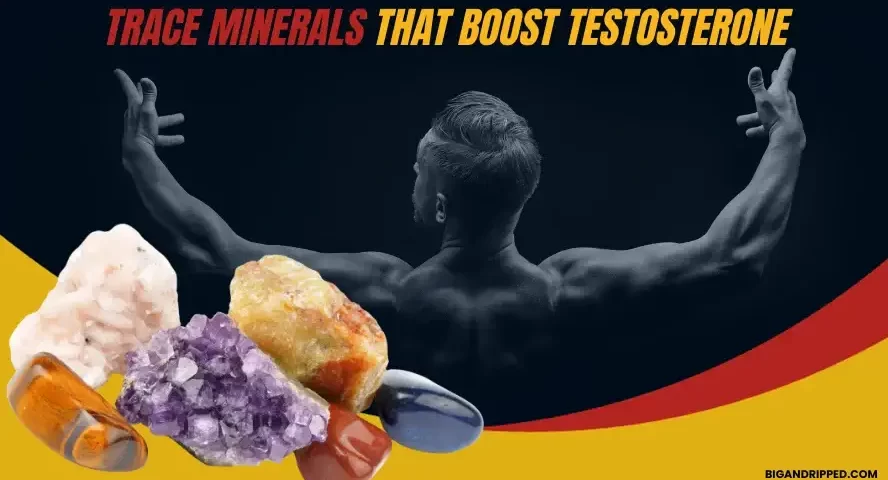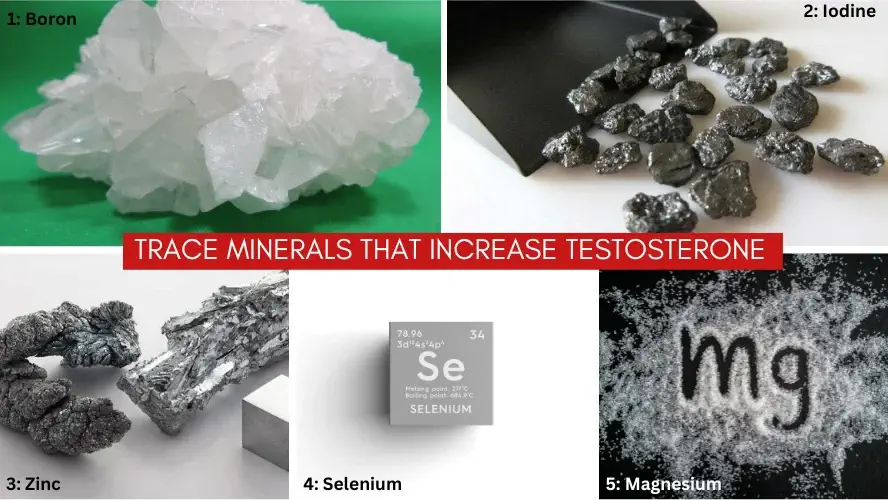- Have any questions?
- hello@bigandripped.com
Does Trace Minerals Increase Testosterone Levels? Know the Science

Boron, zinc, magnesium, copper, and selenium-there are 21 different types of trace minerals in the human body and they can affect your testosterone levels.
That’s right! Believe it or not, you only need mg day−1 amounts of nutritionally essential trace minerals daily.
Still, these trace minerals are essential for physical, mental, and metabolic growth and development.
Studies have provided enough evidence about how these trace minerals can affect testosterone levels.
The decline in testosterone levels is not only because of age but mineral deficiencies are also a major factor. Therefore, a lot of testosterone boosters include these trace elements to accelerate the t-boosting process.
Now, since the body does not naturally produce these trace minerals, you need to maintain their levels through foods and supplements.
Here’s a rundown on the top 5 trace minerals that increase testosterone.
Key Notes
Table of Contents
- Trace minerals are not naturally produced by the body but their deficiency can lead to a decline in testosterone.
- Trace minerals like boron, zinc, magnesium, iodine, and selenium are proven to boost testosterone levels.
- You can include safe testosterone boosters like TestoGen, Prime Male, and Testofuel to tackle testosterone decline due to mineral deficiency.
Trace Minerals that Increase Testosterone
Trace minerals are required by the body for several biological functions and boosting testosterone is one of them.
These trace minerals facilitate a multitude of chemical reactions. Therefore, they are crucial for hundreds of enzymes, essential for hormone secretion, and are even required for normal gonadal development.
A lot of trace minerals like zinc, magnesium, and boron are even directly linked to testosterone production.
Based on the research and evidence, here is a list of trace minerals that boost testosterone and you must include them in your diet.

#1. Boron
Boron is a unique element and a non-essential nutrient that is far from popular. However, those who know about testosterone and bodybuilding know what boron can do for their health.
It has promising effects on training, athletic performance, and hormonal profile.
So can boron boost testosterone levels?
Yes, boron can increase testosterone and there are a lot of studies to prove that.
A study published in the Biological Trace Element Research journal states that supplementation with 10 mg B/d for 4 wk increased plasma testosterone levels.
How does boron increase testosterone?
There are 3 primary ways in which boron increases the testosterone levels.
1. Controls estrogen production – Excess of estrogen can lower testosterone levels. However, supplementing with boron can decrease estrogen production by decreasing estradiol levels and this brings back the testosterone levels to normal.
2. Reduce the Sex Hormone Binding Globulin – The SHBG hormone binds to the free testosterone and converts it into estrogen. A study proves that 6 hours of supplementation of boron can show a significant decrease in SHBG hormone.
3. Improves vitamin D levels- Boron improves the absorption and bioavailability of vitamin D. It works as a catalyst and improves the absorption rate of vitamin D. Notably, vitamin D has a significant role in increasing testosterone levels in men.
The food sources of boron include broccoli, almonds, red grapes, and chickpeas.
Nonetheless, you can also include testosterone boosters like TestoGen which includes 8 mg of boron per serving.
Considering positive Testogen before after reviews, it seems the test booster works well to deliver an increase in primary male sex hormone.
#2. Iodine
Iodine is another trace mineral that increases testosterone. It detoxifies, the body, increases immunity, and also prevents oxidative damage.
Though the element is best known for its impact on thyroid hormone and weight, most of us are unaware of its effect on testosterone.
So can iodine increase testosterone levels?
Yes, improving the iodine levels can enhance the testosterone levels.
As per the results of a study, there was a significant upsurge in the testosterone T3 and T4 levels among the supplemented groups. Iodine is required by every cell of the body and it is quite evident why it’s required for testosterone production.
How does iodine increase testosterone?
Iodine supplementation augments testosterone production by improving the function of Leydig cells.
These cells found in the testes respond to luteinizing hormone and are the primary source of testosterone. Toxic halides namely bromide, fluoride, and chlorine negatively affect the Leydig cells by blocking iodine.
Adding to it, iodine attaches itself to toxic halogens in the Leydig cells and excretes them from the body.
It thus increases its functionality and improves testosterone levels. Along with using iodized salt, you can get enough iodine from seafood, eggs, dairy, and seafood.
#3. Zinc
Zinc is the second most abundant trace mineral in the human body and its deficiency can decrease the testosterone levels.
It is essentially known for its role in muscle protein synthesis, muscle building, and wound healing. However, zinc can regulate more than 100 enzymes and your reproductive health.
But can zinc boost testosterone levels?
Yes, zinc can increase testosterone levels; in fact, a deficiency of zinc can lead to hypogonadism.
In a study published in the Nutrients Journal, 20 weeks of zinc restriction is associated with a decrease in serum testosterone levels.
Whereas, in the same study, zinc supplementation among zinc-deficient men for 6 months increased serum testosterone levels. Notably, often a man with low testosterone levels is also deficient in zinc. (source)
How does Zinc Increase testosterone?
Zinc and testosterone levels are directly linked. Zinc deficiency increases the activation of aromatase and thus results in the conversion of testosterone into estradiol.
Thus zinc slows down the aromatase enzyme leading to a decline in the conversion of testosterone into estrogen hormone.
You can include sesame and pumpkin seeds, mushrooms, cashews, and oysters to increase the level of this trace mineral. Also, you can include testosterone-boosting supplements with enough zinc to boost T levels.
Testofuel is one such supplement that not only includes zinc but also contains oyster extract which is a rich source of this trace element that increases testosterone.
After Testogen, Testofuel is the most recommended supplement for your male hormones. For a better choice go through a comparison analysis to choose the best one Testofuel vs Testogen reviews.
When looking for “what minerals are good for testosterone”, you cannot miss zinc as it is involved in the production and regulation of several enzymes and hormones.
#4. Selenium
Next on the list of trace minerals that increase testosterone is selenium.
Even though this element is needed by the body in small amounts, it is involved in DNA synthesis, cellular repair, and fertility.
But can selenium increase testosterone levels?
Yes, though there is very limited research, it is quite evident that selenium has a positive effect on testosterone production.
A study establishes a direct relationship between selenium and testosterone production. As the study concludes, selenium can enhance the production of Leydig cells.
How does selenium increase testosterone?
As per the results of the study, it regulates oxidative stress and affects the proliferation and apoptosis of Leydig cells.
Adding to it, several other reports show that selenium supplementation led to an increase in testosterone and a decrease in estradiol. This indicates that selenium protects testosterone from SHBG and thus causes an increase in testosterone levels.
This is why selenium is among the minerals that boost testosterone and is found in many bodybuilding supplements and testosterone boosters.
Nonetheless, Brazil nuts are loaded with selenium and you can also consume oysters, sardines, grass-fed beef, and egg yolks to improve selenium in your diet.
#5. Magnesium
If there is a trace mineral that is responsible for most of the biochemicals, it is magnesium.
Notably, magnesium is responsible for over 300 biochemical reactions. This affects everything from sleep to muscle recovery to the muscle-building process.
But can magnesium boost testosterone levels?
Absolutely. These biochemicals also trigger the production of the male sex hormone.
As per a study, 4 weeks of magnesium supplementation and exercise increased testosterone levels in men with sedentary lifestyles as well as athletes. Thus magnesium directly impacts testosterone levels.
How does magnesium increase testosterone?
As per what most of the research reports suggest, supplementing with magnesium lowers the SHBG hormone and thus improves testosterone production.
Additionally, magnesium is also linked with the conversion of magnesium into the active form of vitamin D.
Therefore, magnesium affects testosterone levels both directly as well as indirectly. As a result, apart from being part of muscle-building products, it is also found in many effective test boosters.
Along with Testogen, Testofuel, Prime Male is also a promising testosterone booster and also includes magnesium. It contains 100mg of magnesium per serving. Prime Male maximizes overall performance. Several users have shared their Prime Male before and after reviews along with the transformation pictures that clearly state the effectiveness of the testosterone booster.
However, to know whether it aligns best with your goals, go for Testogen vs Prime Male.
Food sources of magnesium include whole grains, seeds, nuts, and green leafy vegetables.
Though a decline in testosterone is normal after 30, someone experiencing the symptoms of low testosterone before that must get their mineral level tested.
Conclusion
Testosterone is an indispensable hormone for men and this is why they do every possible thing to boost its production.
However, along with including diets, exercises, and foods to boost testosterone, make sure to keep an eye on the trace minerals that increase testosterone.
Though these minerals are required in very small quantities, their deficiency can affect your overall performance including your bedroom performance.
Therefore, if you want to trigger a testosterone boost, tackle the mineral deficiency.

